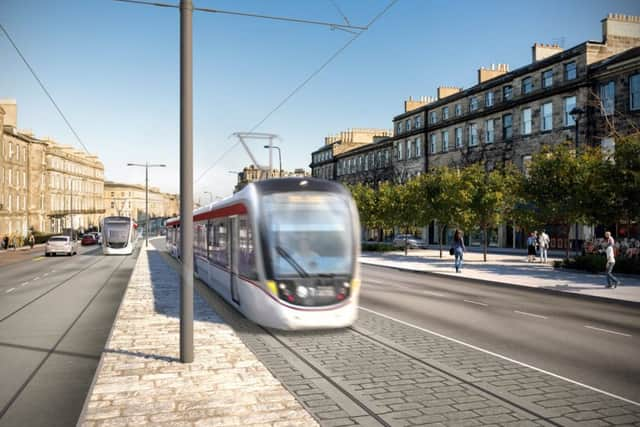Edinburgh Council ‘can’t justify’ waiting for tram inquiry findings
and live on Freeview channel 276
The city council has revealed its final business case for extending the tram line to Newhaven, which will be put to councillors on the authority’s transport and environment committee next week.
The cost of the project has soared by 25 per cent to £207m, in part down to the potential risk of “suicide bidding” by contractors – while £2.4m to support local businesses through the construction period is included in the business case.
Advertisement
Hide AdAdvertisement
Hide AdLeith Walk will be dug up again for “utility conflicts”, despite the route having undergone the overhaul during the initial tram project. Three lanes of Leith Walk will be closed for around 18 months and the line is set to open to passengers in the first quarter of 2023.


Transport and environment convener, Cllr Lesley Macinnes, said: “It will deliver enormous business opportunities in the north of the city. It will deliver safe, secure, sustainable travel for large numbers of passengers – in the first year of operation we are looking at 16m passengers, and those are pretty conservative estimates.
“We have built a lot of caution into every step that we have made. That should build some degree of confidence that the processes that we have gone through to get to this stage.”
If approved by all councillors next month, the project will be funded by borrowing and an agreed £20m dividend from Lothian Buses. The future tram fares will pay off the debt, meaning no funding is taken away from core council services.
Advertisement
Hide AdAdvertisement
Hide AdCosts have increased from the outline business case, published in 2017, from £165m to £207m – with the revised budget including £11m of ‘optimism bias’ as an added layer of insurance. Another £50m will also be allocated in the council’s reserves for any issues encountered during the project.
Finance and resources convener, Cllr Alasdair Rankin, said: “It goes back in many ways to Carillion and the kind of submissions contractors submitted to local authorities in order to win the contract – it was known as suicide bidding.
“They produce as low a figure as they could in order to get their foot in the door and then the motto became ‘land and expand’.
“We found out that there was a danger that some of the bids that had been initially submitted on the tram by these bidders may have been vulnerable to that same problem.”
Advertisement
Hide AdAdvertisement
Hide AdA public inquiry into the first phase of the tram project is still yet to report its findings after costing £776m for a shortened route – more than double the original budget.
The council insists lessons have been learned from the problem-hit first phase – no arms length company is being set up this time and a one-dig approach will result in a swept path contractor opening up the route and removing any utilities, before an infrastructure and systems contractor will come in and complete the work.
Cllr Macinnes said evidence revealed in the inquiry is being taken on board, but that the expected population growth in the Capital meant there was an urgency to press ahead with the extension.
She said: “The problem that we have had all along is the two sets of time-scales are not running very well.
Advertisement
Hide AdAdvertisement
Hide Ad“Since we don’t have a definitive publication date for his findings, how do we then, against all that population growth and all the stress and strain that this will help to deal with, how could we justify hanging on and waiting?”
Cllr Macinnes added: “It was imperative for us to look at what was emerging form the Hardie Inquiry. We have obviously been monitoring very closely the evidence that has been given and it has driven part of the final business case in certain areas.
“It’s not been a question of us ignoring what’s been happening in that inquiry, far from it. I think the degree of caution and care that has gone into the development of this final business case reflects out very great awareness of the Hardie Inquiry and its content.”
Join our Facebook group Our Edinburgh to share images and news from and around the Capital